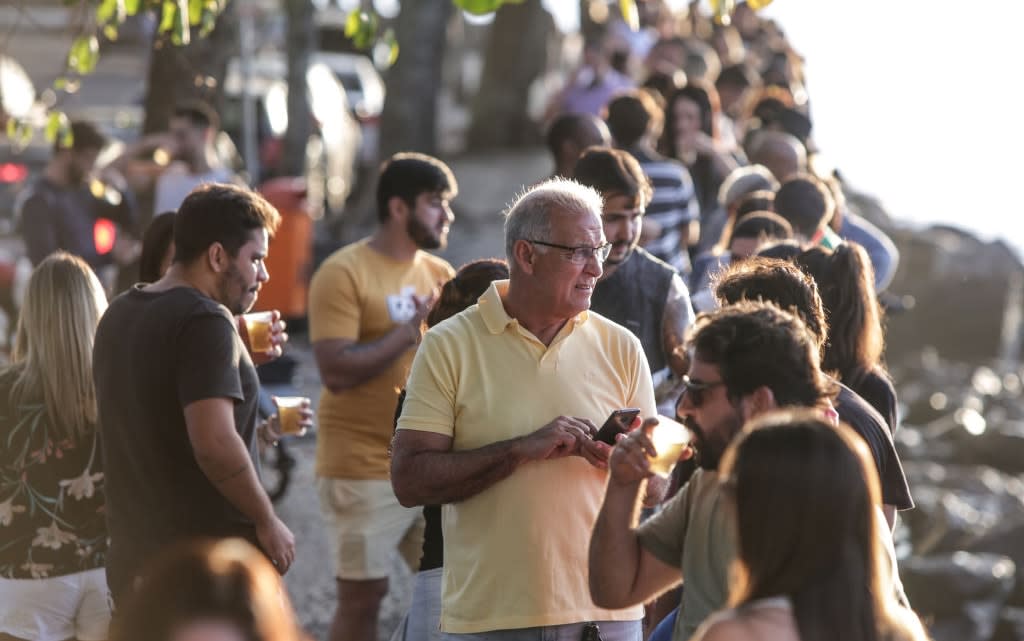Here in Brazil, the lockdown-breaking locals are rooting for herd immunity

Masked up and brimming with excitement, I’m heading for lunch in the Rio neighbourhood of Leblon, eager to enjoy a restaurant meal for the first time in three months – and support a local business at the same time.
We’re warmly welcomed with hand sanitizer and digital menus as La Carioca’s first customers since March 15.
Having recorded 1.76 million cases of Covid-19 and 69,254 deaths, Brazil sits second on the pandemic league table, and the erratic behavour of Jair Bolsonaro has attracted scorn both at home and abroad.
But his scepticism is also shared by many in Brazil. My friend Andre, a Bolsonaro supporter, joins us for lunch and is soon jokingly mocking us for enduring 12 weeks of self-isolation. “There’s no scientific proof that isolation is effective,” he argues. “I believe in vertical isolation [quarantine only for high-risk groups], hygiene and coronavirus preventive measures, but health should always be associated with the economy.”
My housemate, Aline, steps in: “The fact that Bolsonaro doesn’t believe that the virus is serious puts us in a dangerous situation, and just makes people angry.”

Angry or not, the spirit of Rio’s residents hasn’t been broken, and despite the high death toll, La Carioca’s manager, Flavio, tells us he’s optimistic about the future: “I’m confident that people will return. Rio has a very sociable culture, locals want to have fun, this is the Carioca way of life”. Foreigners are currently prohibited from entering Brazil, but he’s certain that tourists will return: “The pound is very strong compared to the Brazilian real, foreigners can live like kings here”.
As for the risk of a second wave, Flavio thinks the worst is over. He explains: “The reality is that Rio de Janeiro didn’t really adhere to a strict lockdown, generally because maintaining social distancing in the favelas is virtually impossible. Compared to cities like London, many people don’t have a comfortable living environment to isolate in. I believe that the city will soon have a very high level of immunity and the second wave of coronavirus cases will be less drastic compared to other countries.”
It’s a popular opinion felt by many Cariocas, and with secret parties rife amongst Brazil’s youth, many are rooting for herd immunity. Everyone agrees that the elderly and those at risk should stay indoors, but many argue that the more young and healthy people that catch Covid-19, the better.
As we walk back from the restaurant, I’m met with an open smile by Paulo, the lifeguard at Arpoador Beach. It is crammed with sunseekers, and I ask him what the current regulations are. “Only individual sports are allowed but as you can see, many are disobeying the rules and sunbathing,” he says.

For a huge coastal city like Rio de Janeiro, there is only so much that the authorities can do to enforce anti-coronavirus measures – the rest is down to the public. Paulo explains that many Cariocas have flouted lockdown rules due to a mistrust in institutions and the local media: “Corruption is rife here in Brazil and many people believe that the pandemic is being used by officials to steal public money”.
Paulo also believes that Brazil’s high death toll does not tell the full story: “The only metric that should be used to measure coronavirus deaths is deaths per million. It’s ludicrous to compare Brazil’s total number of deaths to a smaller country like France.”
After leaving the beach, I make a pit-stop at my local fruit and vegetable market. A vendor, Wellington, tells me: “I’m very happy that I’m working now because I was very depressed at home.” Wellington is one of Brazil’s informal workers, which make up around 40% of its total labour force. Many like him will go hungry if they are not able to work on the streets.
In a city that has a passion for al-fresco living, lockdown has taken both an economic and mental toll on many. As a city that exists almost entirely outdoors; snatching away Rio’s beloved football matches, samba parties, weekend beach trips and social life has been a test on their sanity. While many Cariocas are still choosing to avoid the crowds, global pandemic or not, the “Rio way” of life is to live life to the full and, irrespective of the consequences, they will do just that.


